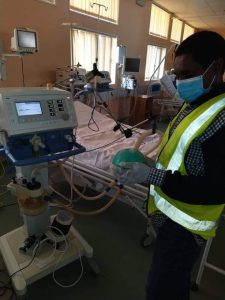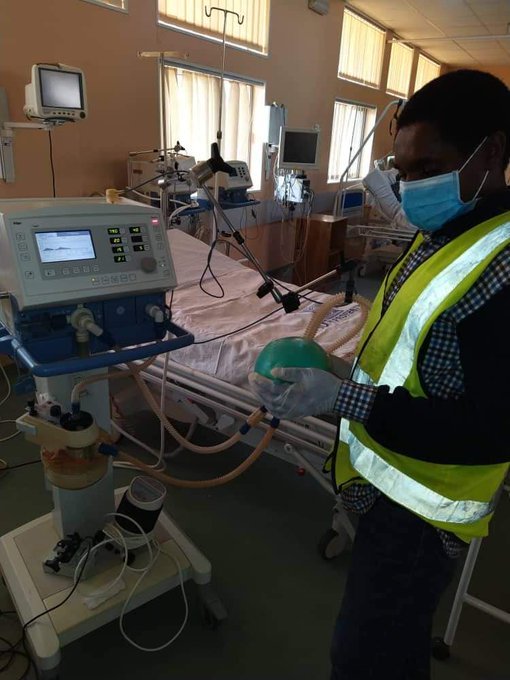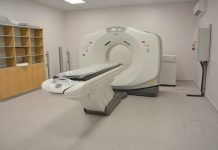Biomedical engineering, a degree program in our Universities is gaining ground in Nigeria but very few persons know about it.
In fact, @Ovieali recently broke the news a Nigerian lady, Adeola Olubamji who became the became the first black person to have a PhD in biomedical engineering in the world 👇 so I was prompted to talk about this new bit very lucrative profession in Nigeria
Meet Adeola Olubamiji , who went from hawking pepper at age ten in Ibadan, to becoming the first Black person to bag a Ph.D. in Biomedical Engineering from Canadian University of Saskatchewan. From having little food to eat before ,to working as Lead Metallurgical Engineer today. pic.twitter.com/W1zt4DUZra
— ᴏᴍᴀsᴏʀᴏ ᴀʟɪ ᴏᴠɪᴇ™☤ (@OvieAli) May 5, 2020
History of Biomedical Engineering (BME) in Nigeria
According to the K. I. Nkuma-Udah and E. A. Mazi’s article on African Journal: “the evolution of biomedical engineering as a separate profession globally climaxed in 1959 with the formation of the International Federation for Medical and Biological Engineering (IFMBE).”
“Nigeria is one of the few African countries with a reasonably organised biomedical engineering practice, where the practice evolved in the 1970s. Most recently,BME is developing at a rapid rate in Nigeria, thanks to the commencement of full complement of BME education (B.Tech, M.Sc and Ph.D) in the FUTO.” They wrote.
Duties of a biomedical engineer
According to Saphina Academy, below are the some of the duties of a biomedical engineer..
Design equipment and devices, such as artificial internal organs, replacements for body parts, and machines for diagnosing medical problems
Install, adjust, maintain, repair, or provide technical support for biomedical equipment
Evaluate the safety, efficiency, and effectiveness of biomedical equipment
Train clinicians and other personnel on the proper use of equipment
Work with life scientists, chemists, and medical scientists to research the engineering aspects of the biological systems of humans and animals
Prepare procedures, write technical reports, publish research papers, and make recommendations based on their research findings
Present research findings to scientists, nonscientist executives, clinicians, hospital management, engineers, other colleagues, and the public.
Subdisciplines
There are many subdisciplines within biomedical engineering, including the design and development of active and passive medical devices, orthopedic implants, medical imaging, biomedical signal processing, tissue and stem cell engineering, and clinical engineering.
Requirements
You need five credit passes in Mathematics, English Language, Physics, Chemistry, and Biology in WAEC or NECO.
For Jamb or UTME, candidates applying for Biomedical Engineering in Nigeria are requested to sit for English Language, Chemistry, Biology and Physics. Mathematics may be required in place of Physics depending on the the chosen university.
Schools, polytechnics and Universities that offer biomedical engineering in nigeria
Universities
the NIGERIAN HEALTH BLOG can authoritatively confirm that the following universities are accredited by the Nigerian Universities Commission (NUC) for Biomedical Engineering:
University of Ilorin (Unilorin)
University of Nigeria, Nssuka
Achievers University, Owo (a private university)
The Technical University, Ibadan (TECH-Ibadan)
Nnamdi Azikiwe University (Unizik)
Federal University of Technology Minna (FUTMINNNA)
Obafemi Awolowo University, Ife
Taraba State University, Jalingo
Micheal Okpara University of Agriculture, Umudike (MOUAU)
Bells University of Technology, Ota, Ogun state
Federal University of Technology, Owo (FUTO)
Only one polytechnic offers BME in Nigeria which is the School of Biomedical Engineering, Maiduguri, Borno state
University of Benin Teaching Hospital School of Biomedical Engineering (the only teaching hospital that have BIOMEDICAL ENGINEERING STUDENTS)
READ ALSO: Veterinary Medicine in Nigeria: History, Universities, Requirements, Salary and Hospitals
How Lucrative is biomedical engineering in Nigeria/biomedical engineering salary in Nigeria.
The NIGERIAN HEALTH BLOG cannot comfortably say how lucrative the biomedical engineering profession is because it is still very new.
A biomedical engineer however told our correspondent that he was paid around NGN80,000 – NGN130,000 per month as start up salary when he newly graduated and was employed in a teaching hospital here in Nigeria.
Biomedical engineers can earn as much as NGN300,000 monthly depending on their level and where they are working.

Problems of biomedical engineering in Nigeria
Well every profession has its challenges and Biomedical Engineering also have it’s fair share of problems in Nigeria. The NIGERIAN HEALTH BLOG will itemize them
1. Lack of awareness about course of study as a degree program or as a course of study at all
2. Lack of awareness about profession by Nigerians even among other health care providers
3. Many universities in Nigeria do not offer biomedical Engineering
4. Accreditation Problems: Most of the universities are fully accredited for the program.
5. Lack of practical facilities for training in our universities. Equipments available are at best not up to date with recent development.
6. Poor remuneration…. Graduates of Biomedical Engineering are poorly paid.
7. Lack of jobs. There are unemployed Biomedical Engineers roaming the streets of Nigeria… But this is rare these days.
8. Over-reliance of imported medical equipments.
9. Poor funding of biomedical research projects.
10. Epileptic power supply…Biomedical equipments depends heavily on stable electricity.
11. Issues with very few biomedical engineers in Nigeria
Where can a Biomedical Engineer work?
Any where. It is an all encompassing profession. A biomedical engineer can work in hospitals, pharmaceutical companies, research laboratories, medical software companies, engineering companies and so on.
Honourable Mentions
April 1st 2020, the NIGERIAN HEALTH BLOG via its Twitter handle reported that 2 biomedical engineers from Plateau, Gyan William and Nuru Jibrin helped the Jos University Teaching Hospital (JUTH) to repair their broken ventilators for free. They were very much celebrated because ventilators have become a very scarce commodity especially in the face of the COVID-19 pandemic. Gyan and Nuru, who are also friends promised to produce ventilators if supported.
These two men Gyang William & Nura Jibrin quietly walked into Jos University Teaching Hospital, JUTH & requested to fix all their broken down ventilators at NO COST as part of their contribution to fight against Covid-19. They promised to help build new ones. pic.twitter.com/8XXJ2UcRDe
— Nigerian Health Blog (@DrUdomoh) April 1, 2020
























